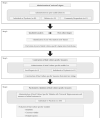A theoretical and empirical framework for constructing culture-specific stigma instruments for Chile
- PMID: 23990755
- PMCID: PMC3753780
- DOI: 10.1590/s1414-462x2013000100011
A theoretical and empirical framework for constructing culture-specific stigma instruments for Chile
Abstract
Different cultural contexts contribute to substantial variation in the stigma faced by people with psychosis globally. We propose a new formulation of how culture affects stigma to create psychometrically-validated tools to assess stigma's culture-specific effects. We propose to construct culture-specific stigma measures for the Chilean context via: 1) open-ended administration of 'universal' stigma scales to a sample of individuals with psychosis, relatives, and community respondents; 2) qualitative analyses to identify how culture shapes stigma and to derive initial 'culture-specific' stigma items; 3) construction and pilot-testing of final 'culture-specific' stigma measures; 4) initial psychometric validation among a sample of individuals with psychosis. We identify initial hypotheses for how stigma might threaten the capacities to participate in fundamental activities that 'matter most' in the Chilean context. These include mental illness stigma threatening the man's ability to protect the honor of the family, and the woman's ability to be a 'holy and pure' mother. Mental illness stigma may further endanger the ability of the family to uphold reciprocal obligations within their social network. Developing such measures promises to aid efforts to address culture-specific forms of stigma, and to facilitate implementation of community mental health services, in Chile and other Latin American contexts.
Keywords: Latin America; culture; mental health; social stigma.
References
-
- Thornicroft G, Brohan E, Rose D, Sartorius N, Leese M, INDIGO Study Group Global pattern of experienced and anticipated discrimination against people with schizophrenia: a cross-sectional survey. Lancet. 2009;373(9661):408–15. - PubMed
-
- Goffman E. Stigma: Notes on the Management of Spoiled Identity. Prentice-Hall; New York: 1963.
-
- Esses VM, Zanna MP. Mood and the expression of ethnic stereotypes. J Pers Soc Psychol. 1995;69:1052–68.
-
- Lin MH, Kwan VS, Cheung A, Fiske ST. Stereotype content model explains prejudice for an envied outgroup: Scale of anti-Asian American stereotypes. Pers Soc Psychol Bull. 2005;31(1):34–47. - PubMed
-
- Crandall CS, Martinez R. Culture, ideology, and anti-fat attitudes. Pers Soc Psychol Bull. 1996;22:1165–76.
Grants and funding
LinkOut - more resources
Full Text Sources
Other Literature Sources
Medical

